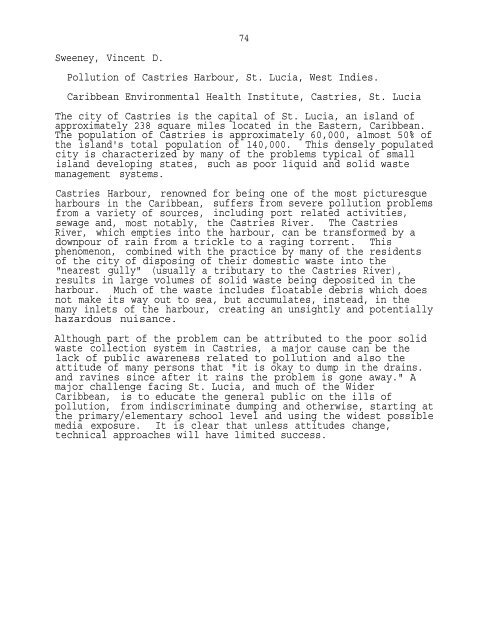Poster abstracts and manuscripts from the Third International ...
Poster abstracts and manuscripts from the Third International ...
Poster abstracts and manuscripts from the Third International ...
You also want an ePaper? Increase the reach of your titles
YUMPU automatically turns print PDFs into web optimized ePapers that Google loves.
Sweeney, Vincent D.<br />
Pollution of Castries Harbour, St. Lucia, West Indies.<br />
74<br />
Caribbean Environmental Health Institute, Castries, St. Lucia<br />
The city of Castries is <strong>the</strong> capital of St. Lucia, an isl<strong>and</strong> of<br />
approximately 238 square miles located in <strong>the</strong> Eastern, Caribbean.<br />
The population of Castries is approximately 60,000, almost 50% of<br />
<strong>the</strong> isl<strong>and</strong>'s total population of 140,000. This densely populated<br />
city is characterized by many of <strong>the</strong> problems typical of small<br />
isl<strong>and</strong> developing states, such as poor liquid <strong>and</strong> solid waste<br />
management systems.<br />
Castries Harbour, renowned for being one of <strong>the</strong> most picturesque<br />
harbours in <strong>the</strong> Caribbean, suffers <strong>from</strong> severe pollution problems<br />
<strong>from</strong> a variety of sources, including port related activities,<br />
sewage <strong>and</strong>, most notably, <strong>the</strong> Castries River. The Castries<br />
River, which empties into <strong>the</strong> harbour, can be transformed by a<br />
downpour of rain <strong>from</strong> a trickle to a raging torrent. This<br />
phenomenon, combined with <strong>the</strong> practice by many of <strong>the</strong> residents<br />
of <strong>the</strong> city of disposing of <strong>the</strong>ir domestic waste into <strong>the</strong><br />
"nearest gully" (usually a tributary to <strong>the</strong> Castries River),<br />
results in large volumes of solid waste being deposited in <strong>the</strong><br />
harbour. Much of <strong>the</strong> waste includes floatable debris which does<br />
not make its way out to sea, but accumulates, instead, in <strong>the</strong><br />
many inlets of <strong>the</strong> harbour, creating an unsightly <strong>and</strong> potentially<br />
hazardous nuisance.<br />
Although part of <strong>the</strong> problem can be attributed to <strong>the</strong> poor solid<br />
waste collection system in Castries, a major cause can be <strong>the</strong><br />
lack of public awareness related to pollution <strong>and</strong> also <strong>the</strong><br />
attitude of many persons that "it is okay to dump in <strong>the</strong> drains.<br />
<strong>and</strong> ravines since after it rains <strong>the</strong> problem is gone away." A<br />
major challenge facing St. Lucia, <strong>and</strong> much of <strong>the</strong> Wider<br />
Caribbean, is to educate <strong>the</strong> general public on <strong>the</strong> ills of<br />
pollution, <strong>from</strong> indiscriminate dumping <strong>and</strong> o<strong>the</strong>rwise, starting at<br />
<strong>the</strong> primary/elementary school level <strong>and</strong> using <strong>the</strong> widest possible<br />
media exposure. It is clear that unless attitudes change,<br />
technical approaches will have limited success.
















